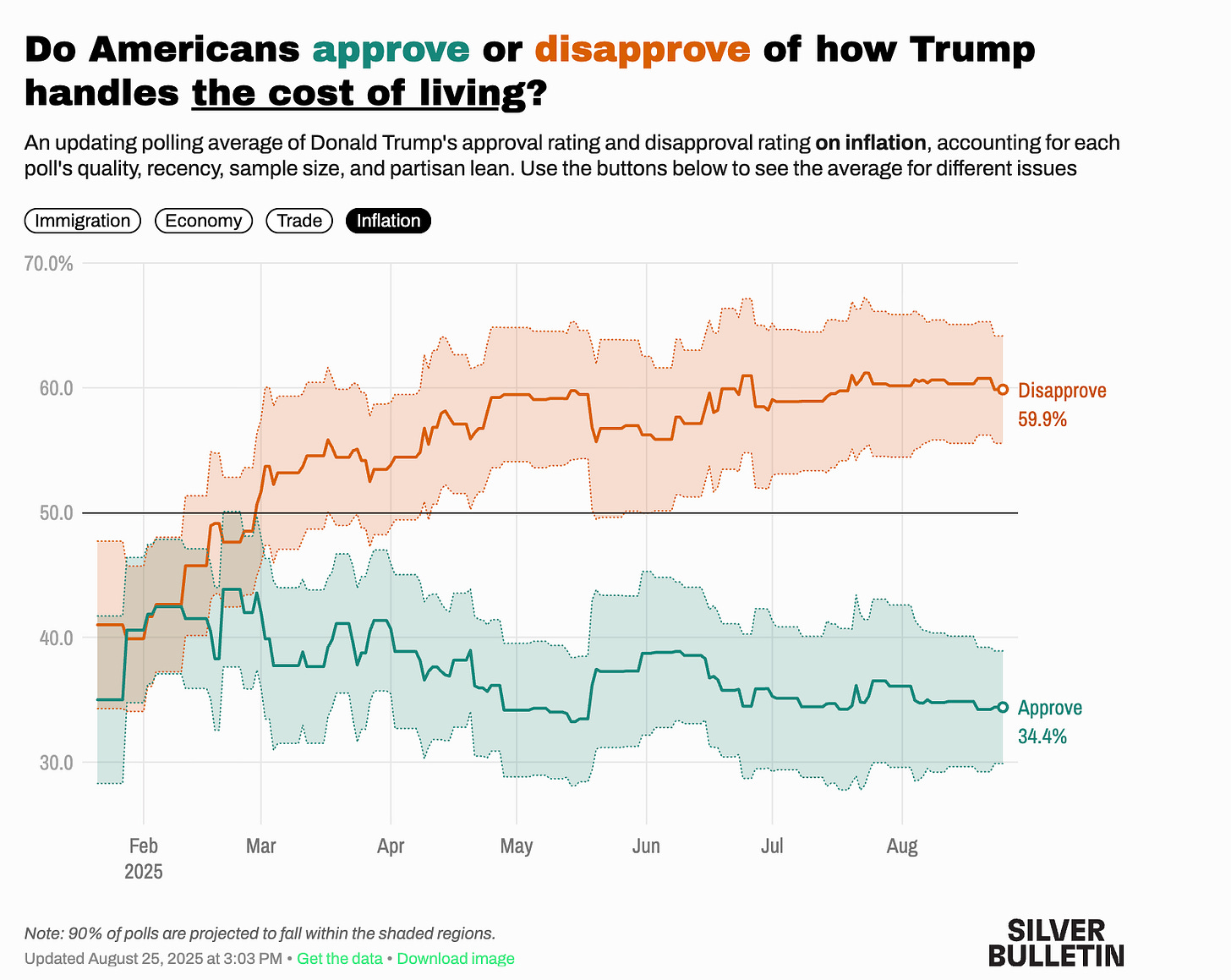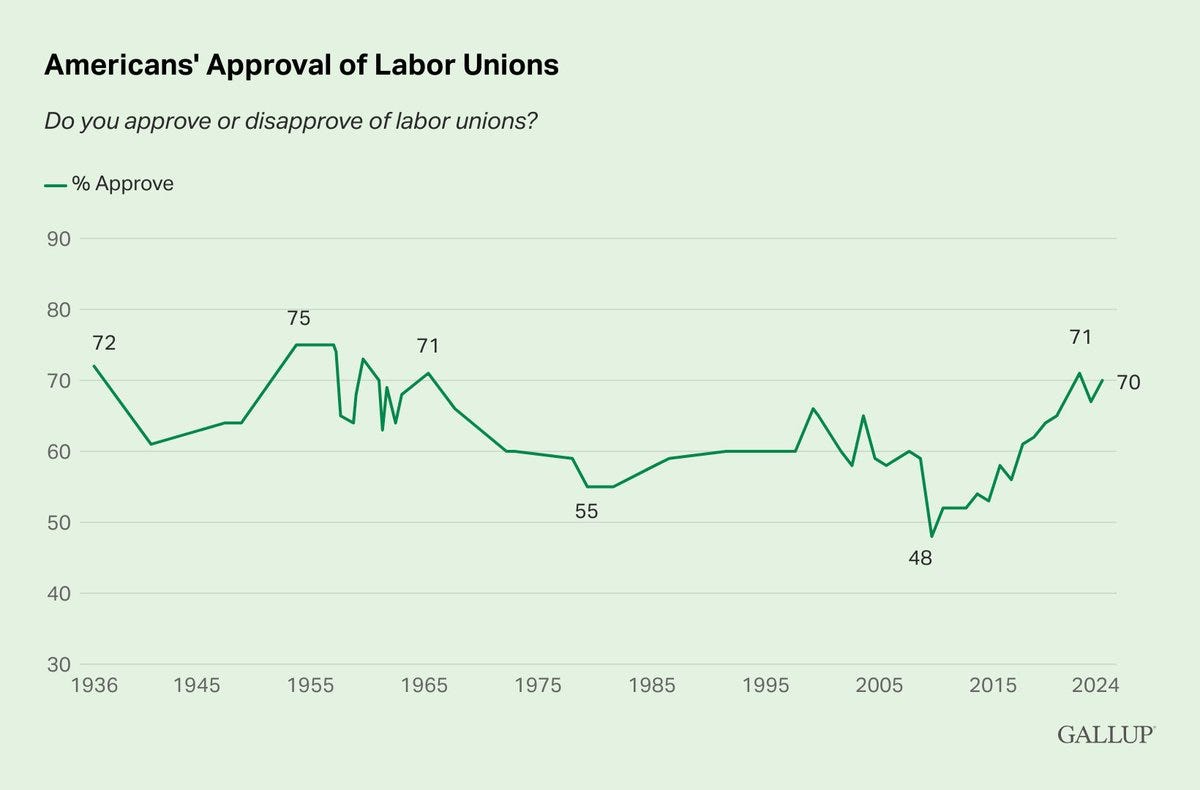The Path to Defeating MAGA Runs Through the Working Class
Democrats must return to their roots as the party of the working class
This upcoming weekend, elected Democrats will fan out across the nation to attend Labor Day picnics and parades, waxing nostalgic about the party’s long history of fighting for labor unions.
For as long as I’ve worked in politics, Labor Day has been a critical holiday for Democrats. It’s not just the kickoff of campaign season in election years — it has been an opportunity to draw a sharp contrast with Republicans. We were the party of the working class and union members; Republicans were the party of the rich and powerful corporations.
But this Labor Day, Democrats need to look in the mirror. Whatever story we want to tell ourselves, we are no longer the party of the working class. We are losing working-class voters — the core of our coalition since the New Deal — to a corrupt billionaire with a gold toilet, infamous for scamming workers and cutting taxes for the rich.
Fighting Trump and defeating MAGA extremism begins with Democrats thinking hard about how to rebuild the multi-racial working-class coalition.
Message Box is a reader-supported newsletter that explains what’s happening in politics—and gives you actionable steps to push back against MAGA in the fight for democracy. Sign up today and get your first month free.
A Dramatic and Disturbing Shift
For most of the last 75 years, Democrats were the party of the working class. That’s how we were known, and that’s who our policies were designed for. The path to the White House ran through cities and the industrial Rust Belt, and union members were central to our coalition.
So much has changed in a very short period of time.
In 2012, Barack Obama won voters making under $50,000 a year by 22 points. In 2024, Kamala Harris lost those voters by two points. In 2012, Mitt Romney won voters making over $100,000 by 10 points. Last year, Harris won them by 4.
Despite Joe Biden being one of the most pro-union presidents in history — and despite Republicans pushing anti-union Right to Work laws — Democrats saw a similar pattern with voters in union households (the way pollsters ask the question). In 2012, Obama won union households by 18 points. Harris won them by just 8.
In terms of education and income, the Democratic Party of 2024 looks a lot like the Republican coalition that supported Mitt Romney in 2012: more college-educated, wealthier, and more suburban. There are advantages to this shift. Because college-educated suburban voters are high-propensity voters, Democrats tend to do very well in special elections and midterms. But it’s a huge challenge in presidential elections. According to the 2024 exit polls, 59% of voters reported making less than $100,000 (Trump won that group by 4), and 57% did not graduate college (Trump won non-college graduates by 13 points).
This represents a complete inversion of the long-term coalitions of both parties. Democrats may call ourselves the party of the working class, but fewer and fewer working-class voters seem to agree.
Brainstorming the Path Back
That’s the bad news. The good news is that Democrats now have the opportunity to reshape American politics, rebuild our coalition, and reclaim our identity as the party of the working class.
Donald Trump ran and won on two ideas: he would lower costs and take on a corrupt, broken political system that has failed the working class for far too long. In his first eight months as president, Trump has made both problems worse. His tariffs have raised costs, weakened the economy, and exacerbated inflation. His numbers on inflation, per Nate Silver, are truly abysmal — as bad as Biden’s in 2024.
From crypto scams to free jets to sweetheart real estate deals to an administration stocked with billionaires, Trump is running the most blatantly corrupt White House in history.
It’s not reasonable to expect everyone to take off their MAGA hats and abandon Trump overnight, and we’re not going to return to the 2012 coalition anytime soon. But Democrats can win back some of the working-class voters we’ve lost in the last two elections.
This is a massive project that requires buy-in from party leadership and a commitment to driving a message that resonates and breaks through. It means questioning some of our priors and taking on sacred cows. I don’t have all the answers, but here are a few places where Democrats should start:
A Populist Affordability Agenda That Pisses Off the Right People
The cost of living is the defining issue of our time. It consistently tops voters’ lists of concerns. Democrats need an aggressive, attention-grabbing affordability agenda. This is where they should take a lesson from Zohran Mamdani: for something to break through, it must be controversial enough to piss some people off. I’m not saying Democrats should embrace city-run grocery stores, but we need ideas that show we’re willing to be aggressive and take on powerful interests. In campaigns, policy is largely a proxy for who you will fight for and which special interests you’re willing to confront. If it’s just the same warmed-over tax credits Democrats have been offering for years, we’ll make no progress.
Become Even More Pro-Union
To his credit, Joe Biden was one of the most pro-union presidents in recent history. He walked a picket line and consistently pushed policies that strengthened unions and collective bargaining. In the Trump era, Democrats should go even further. Too many Democrats remain reluctant to boldly proclaim support for unions and make strengthening them a core part of their economic agenda. Unions have rarely been more popular.
Being proudly pro-union also has the added benefit of pissing off the right people — once again ensuring attention and contrast.
Take on Corporate Power and Corruption in Politics
One reason Democrats lost in 2024 is that, in our efforts to stand up to Trump, we positioned ourselves as saviors of democracy and defenders of norms. But most voters see politics and politicians as corrupt. To them, we were branding ourselves as defenders of a broken system. That’s why many voters who agree with our policies don’t trust us to fight for them.
One way to win back working-class voters is to once again become the party that wants to fix politics and reform the system. That means adopting and aggressively pushing an anti-corruption agenda that could include:
Banning members of Congress from trading stocks
Ending dark money in politics
Preventing members of Congress and senior officials from becoming lobbyists when they leave government service
Term limits for members of Congress and Supreme Court justices
There are many more ideas than these, but the goal is to get on the right side of the insider/outsider divide in politics.
The future of the Democratic Party — and of democracy itself — depends on the party returning to its roots. But that requires charting a new path forward.




Democratic-Farmer-Labor Party: Farmers, truck drivers, railroad workers --- the people I come from believed in the DFL and unions. I was the first in my family to earn a college degree thanks to the Pell Grant and other grants and loans brought to me by liberal policies. Do you know how poor you had to be in the 80s to qualify? I do. I also know that I get lumped in with college-educated suburban white women voters, which doesn't reflect the fact that I spend half of my life on a Native reservation and am definitely not well-to-do. So STOP! Stop talking about voters in categories. Stop winning groups of voters and start winning human beings! I for one would like to see someone who sees all voters as human beings with essential needs. Someone who is planning for the obstacles we all face. A UNIFIER who can speak to the big tent. Because winning voters by focusing on what divides us does not seem to be working.
Dan, I very much agree with the anti-corruption proposals. Additionally, I'd like to see Dems strongly push a broad mantra to "rebuild our middle class." Every proposal should mention this aim. Start with tax code overhaul. Simplify it and make it transparent, and more fair! Orient the tax code to more favor true work (goods or services) vs. passive investment income and so many loopholes that benefit the already wealthy. Propose further tax benefits for community service workers, eg, public school teachers, police and fire. Not only could this approach be good policy, but also politically potent.